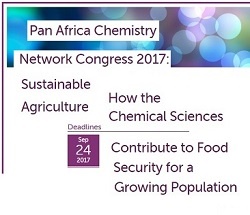24 September : Abstract Deadline : Pan Africa Chemistry Network Congress 2017: Sustainable Agriculture ...


On 7 - 9 November 2017, Accra, Ghana will host Pan Africa Chemistry Network (PACN) Congress 2017: Sustainable Agriculture; How the Chemical Sciences Can Contribute to Food Security for a Growing Population.
The Congress expects to attract 200-300 delegates from Africa, UK and globally, including many leading researchers and policy-makers, to discuss current research, challenges, new developments and crucial issues on the topic of Sustainable Agriculture.
_________________________________________________________________________________________________![]() Submit your abstract till 24 September 2017!
Submit your abstract till 24 September 2017! ![]() The Congress will be free to attend but your to registration (open in October 2017) to guarantee your place is required. Contact Royal Society of Chemistry by email.
The Congress will be free to attend but your to registration (open in October 2017) to guarantee your place is required. Contact Royal Society of Chemistry by email.
_________________________________________________________________________________________________
The PACN Congress is a Royal Society of Chemistry flagship annual event for the African chemical sciences community and consists of 3 days of lectures, discussions, exhibitions, posters and networking.
The Congress will:
- reflect the diversity of science and research that can help solve challenges of food security and progress towards sustainable agriculture, with a focus on the chemical sciences;
- give all participants the opportunity to engage with other scientists, hear about cutting edge research and policy and exchange ideas. Previous events have led to new collaborations and partnerships across Africa and the globe.
In 2011 the PACN Congress held in Ghana to explore “Agricultural Productivity: How the Chemical Sciences Can Help to Feed the World”, and this led to the publication of a Policy Report.
Building on this, we now want to bring the community together once again to look at the progress that has been made, and the new challenges faced by African agriculture, especially with ongoing climate change.
There will be 4 themes covered in the scientific sessions:
- Chemistry for Crop Protection:
To protect crops from pests and other degradation. This will include strategies for crop protection, chemicals for crop protection, including natural product chemistry and/or green approaches to manufacture. This could include ways to increase on-farm yields and issues of storage and transport, as well as topics around regulation and policy, environmental impacts and the use of banned chemicals.
- Crop and Soil Nutrition:
Ways to ensure optimal growth of crops. Fertilisers, land management and soil science are all vital to this. We will discuss soil health, soil protection, mapping and monitoring, as well as sustainable ways to improve soil resilience and soil quality. We will also cover research that seeks to understand the dynamic natural processes that take place in ecosystems to use or regenerate the nutrients needed by crops.
- Sustainable Agriculture for Economic Development: The Case of Cocoa
Cocoa is Ghana’s principal agriculture export, with annual exports valued at $2.59b (OEC 2015) and so it is vital for many African economies that cocoa production is efficient and sustainable. We will discuss the challenges faced by the cocoa industry and innovation from the chemical sciences which will benefit the industry and its communities into the future.
- Future Farming
How to ensure a nutritious food supply for a growing population. This will include the challenges of climate change and the demand for land for non-food crops. We will discuss ways that science can make agriculture more sustainable through climate- smart- crops and crop management as well as ways to increase resilience. This session will also cover ways to ensure the that the food supply is nutritious, and contains the micro and macro nutrients needed for health.
We will also look at how sustainable agriculture can impact on the economic growth of African countries, many of which have been impoverished by the shift from agriculture to other economic activities such as mining and oil exploration which are having negative impacts on their environments.
Each of these topics will also include discussions on aspects of the following areas where relevant to the overall topic: Analytical chemistry; formulation science; water science; abiotic stress; regulatory issues; socioeconomic issues and work to define or understand ‘The African context’.
Multidisciplinary and cross disciplinary research related to the chemical sciences is welcomed and encouraged !
Abstract Submission
There are 3 types of abstract submission for this year’s PACN Congress. Please see below for details.
Funding to attend is ONLY be available for African scientists, working in Africa, selected by the scientific committee to make oral presentations or flash presentations.
Oral presentation abstracts
Approximately 10 people will be selected to give oral presentations to the conference audience (20-minute slot). Those wishing to present need to select which session is best suited to their research topic.
Full funding is available to the selected oral presenters.
Deadline: 24 September 2017
Flash presentation abstracts
Approximately 10 people will be selected to give a flash presentation to the conference audience (10-minute slot). Those wishing to present need to select which session is best suited to their research topic. You are also required to produce a poster on your research topic.
Full funding is available to the selected flash presenters.
Deadline: 24 September 2017
Posters
There is no requirement to submit a poster abstract, the scientific committee welcomes all registered delegates to bring a poster for display. There is NO FUNDING AVAILABLE to poster presenters.
Deadline: 24 September 2017
Speakers:
· John Clough Sygenta, United Kingdom
· Helen Driver Royal Society of Chemistry, United Kingdom
· Jacob Midiwo University of Nairobi, Kenya
· Derek Stewart The James Hutton Institute, United Kingdom
More speakers to be confirmed soon.
Useful links
Source: Royal Society of Chemistry

